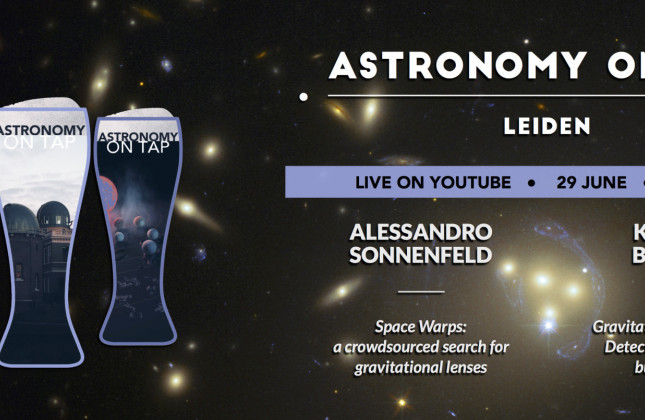Astronomy on Tap: Our Universe's Biggest Magnifying Glasses (online)
Alessandro Sonnenfeld and Kirsty Butler, both astronomers in Leiden, will tell the online audience about our Universe's biggest magnifying glasses. Grab a drink, get comfortable, and join the discussion for an evening of informal astronomy and fun games (in English). The event will be broadcasted the youtube-channel of Astronomy on Tap Leiden.
Alessandro Sonnenfeld: "Space Warps: a crowdsourced search for gravitational lenses"
Alessandro was born and raised in Lucca, Italy. He did his undergraduate studies at the University of Pisa (Italy), and got his PhD at the University of California Santa Barbara in 2015. From 2015 to 2018 he was a postdoctoral researcher at the Kavli Institute for the Physics and the Mathematics of the Universe in Kashiwa (Japan). Since September 2018, he is a Marie Sklodowska-Curie postdoctoral fellow at Leiden Observatory. In his talk, Alessandro will describe how gravity bends light. When a galaxy happens to lie behind a massive object, such as another galaxy, its image gets magnified and distorted into a set of arc-like images. This phenomenon is called gravitational lensing. Gravitational lenses are spectacular and very useful, but rare and difficult to find. Volunteers from all around the world were asked to help discover new lenses by looking through 300,000 images of galaxies. Alessandro will present the results from this campaign.
Kirsty Butler: "Gravitational Lensing and Detecting the Silent but Deadly"
Kirsty grew up in Perth, Western Australia where she studied Maths and Physics at the University of Western Australia (UWA), continuing onto a Masters of Astrophysics at the International Centre for Radio Astronomy Research (ICRAR), researching the angular momentum of local dwarf galaxies. Currently, Kirsty is a PhD Candidate at Leiden Observatory and self proclaimed Gastronomer. Her work focuses on understanding the role and impact of galaxy scale winds in the formation and evolution of their host galaxies. She has particular interest in the early universe where galaxies are growing rapidly, and winds ejected by star formation, supernovae or blackhole activity are at a peak. In order to observe these incredibly faint and distant outflows Kirsty's work requires using some of the worlds largest telescopes as well as the Universe's strongest lenses; gravitational lenses. In her talk, she will demonstrate the use of strong gravitational lenses as giant cosmic magnifying glasses, zooming in on the faint signatures of galaxy digestion in the distant universe.
All ages and backgrounds are welcome. As always, we will have fun games where you can win cool science prizes.
More info: check out www.astronomyontap.nl
